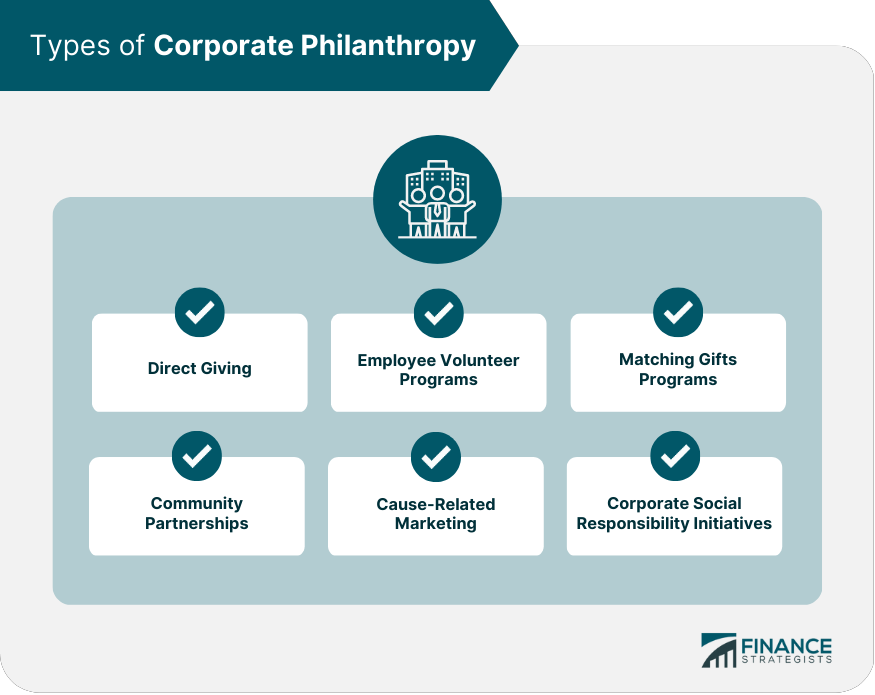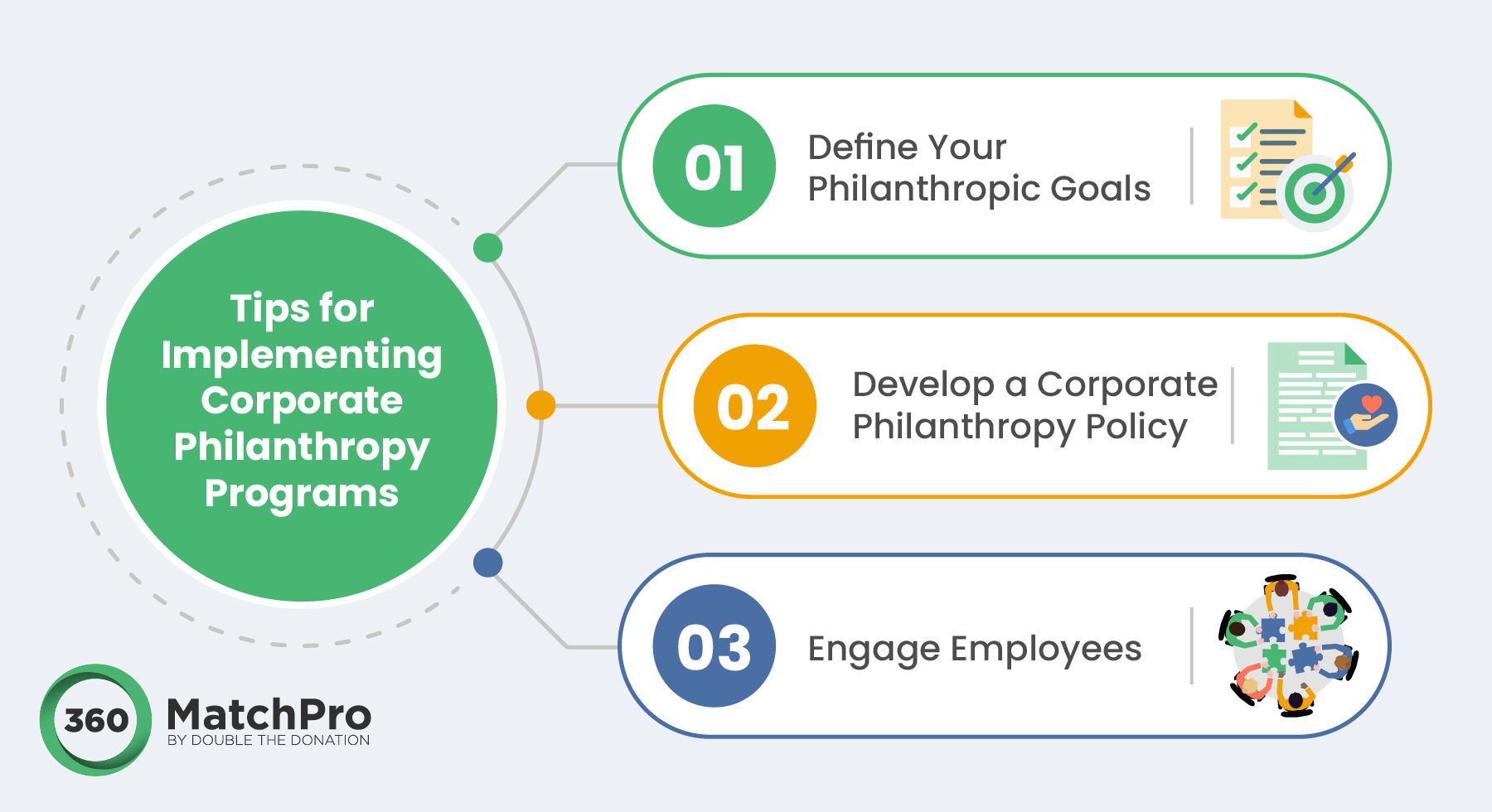Corporate philanthropy in action: true case studies that deliver results
The Role of Business Philanthropy in Fostering Sustainable Company Practices
Corporate philanthropy has emerged as a critical approach for companies aiming to incorporate sustainability into their operations. By straightening business objectives with social and environmental initiatives, organizations can cultivate much healthier environments. This approach not just enhances business track record yet also enhances stakeholder connections. Nevertheless, the real degree of its influence on long-lasting business success continues to be to be explored. What cutting-edge practices are being adopted consequently?
Understanding Corporate Philanthropy and Its Relevance
Corporate philanthropy acts as a crucial mechanism where companies can contribute to social health while improving their very own reputations. This technique includes organizations allocating sources, such as funds, time, or knowledge, to support area efforts, philanthropic reasons, or social programs. By taking part in humanitarian initiatives, business can address pressing social issues, such as education, health care, and ecological issues, thereby playing a pivotal function in promoting positive change.
Business philanthropy can enhance worker morale and attract ability, as individuals progressively look for to work for socially responsible companies. It can additionally reinforce client commitment, as consumers choose brands that demonstrate a dedication to making a difference. Inevitably, understanding the relevance of company philanthropy hinges on recognizing its twin benefits: enhancing community well-being while simultaneously improving business credibility and dependability in the eyes of stakeholders. This positioning of social duty with commercial rate of interests emphasizes its significance in today's corporate landscape.
The Link In Between Corporate Philanthropy and Sustainability
While lots of firms participate in philanthropy to boost their public picture, a much deeper connection exists in between business philanthropy and sustainability. Business philanthropy often lines up with lasting techniques by supporting efforts that resolve environmental and social difficulties. When organizations purchase neighborhood jobs, renewable resource, or curricula, they contribute to a healthier ecological community and culture. This commitment not only fosters goodwill but likewise enhances stakeholder connections, improving brand loyalty.

Instance Studies: Successful Business Philanthropy Initiatives
Various companies have actually effectively integrated philanthropic initiatives into their organization methods, demonstrating the tangible advantages of such dedications. For circumstances, Microsoft has launched many programs, such as its AI for Earth campaign, which sustains ecological sustainability with modern technology. This method not only aids preservation efforts however also improves Microsoft's online reputation as a leader in business responsibility.
In a similar way, Unilever's Sustainable Living Strategy stresses ecological and social impact, straightening its try this web-site philanthropy with business goals. By moneying projects that enhance health and sanitation, Unilever strengthens its brand while adding to global health and wellness.
An additional noteworthy instance is Patagonia, which promises 1% of sales to ecological reasons. This commitment resonates with customers, cultivating commitment go to my site and driving sales.
These instance studies highlight that reliable company philanthropy can produce financial returns while promoting lasting practices, reinforcing the idea that ethical organization techniques are useful for both culture and profits.
Building Stronger Stakeholder Relationships Via Philanthropy
Philanthropy works as a necessary device for companies seeking to strengthen their connections with stakeholders, as it promotes count on and shows a dedication to social obligation. By participating in philanthropic campaigns, companies can connect with regional areas, boosting their online reputation and encouraging stakeholder commitment. This interaction typically causes significant communications, developing a feeling of shared worths in between the business and its stakeholders.
Philanthropic efforts can resolve details community demands, enabling organizations to contribute favorably to social difficulties. This involvement not only showcases a firm's moral stance but likewise helps in bring in and maintaining clients who focus on social duty.
Furthermore, employees frequently feel extra inspired and engaged when they see their company actively taking part in kind activities, leading to an extra efficient workplace society. Corporate philanthropy ends up being a tactical method for developing stronger, a lot more resilient connections with varied stakeholder groups.
Gauging the Impact of Business Philanthropy on Service Success
The connection in between corporate philanthropy and stakeholder interaction establishes the stage for reviewing its impact on general organization success. Organizations frequently determine this impact with different metrics, consisting of brand name reputation, worker satisfaction, and client commitment. Philanthropic campaigns can boost a firm's image, fostering trust fund amongst consumers and investors alike. Engaged employees have a tendency to exhibit greater spirits and productivity, directly associating to improved business performance.
Measurable evaluation can additionally be used, with companies reviewing economic returns versus humanitarian expenditures. Research indicates that companies with strong kind dedications usually experience greater stock performance and decreased volatility. Additionally, qualitative assessments, such as stakeholder responses, can supply insights right into area assumptions and long-lasting relational benefits.
Inevitably, measuring the impact of company philanthropy needs a multifaceted approach, incorporating both measurable and qualitative data to guarantee a comprehensive understanding of its impact on service success. corporate philanthropy.
Often Asked Questions
Just How Can Local Business Engage in Business Philanthropy Efficiently?

What Are Common Misunderstandings Concerning Business Philanthropy?

How Does Company Philanthropy Impact Worker Morale?
Company philanthropy positively influences staff member morale by fostering a feeling of function, enhancing work contentment, and promoting commitment. Workers typically feel extra engaged and motivated when their firm adds to social reasons, producing a supportive workplace.
What Are the Tax Obligation Benefits of Company Philanthropy for Services?
Corporate philanthropy uses significant tax obligation benefits for organizations, consisting of deductions on charitable contributions and possible decreases in gross income. These motivations encourage companies to participate in social initiatives while all at once enhancing their monetary standing.
Just How Can Companies Choose Reliable Philanthropic Allies?
Companies can select reliable kind companions by assessing placement with their worths, gauging effect potential, checking out economic openness, and promoting solid interaction. This critical technique boosts partnership and guarantees shared benefits for both parties entailed.
Corporate philanthropy offers as an important device through which organizations can contribute to societal well-being while boosting their very own track records - corporate philanthropy. Inevitably, recognizing the importance of corporate philanthropy lies in identifying its dual advantages: enhancing area well-being while all at once boosting business reputation and credibility in the eyes of stakeholders. While many firms engage in philanthropy to enhance their public picture, a much deeper link exists in between company philanthropy and sustainability. The connection between company philanthropy and stakeholder engagement sets the phase for evaluating its impact on general organization success. Company philanthropy uses considerable tax advantages for businesses, including deductions on charitable contributions and possible decreases in taxable income